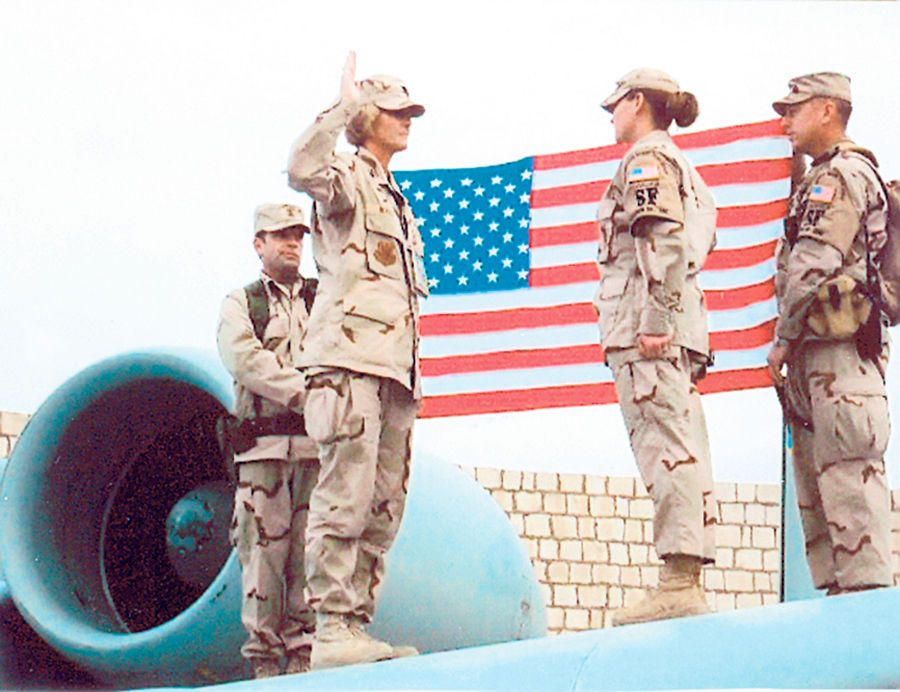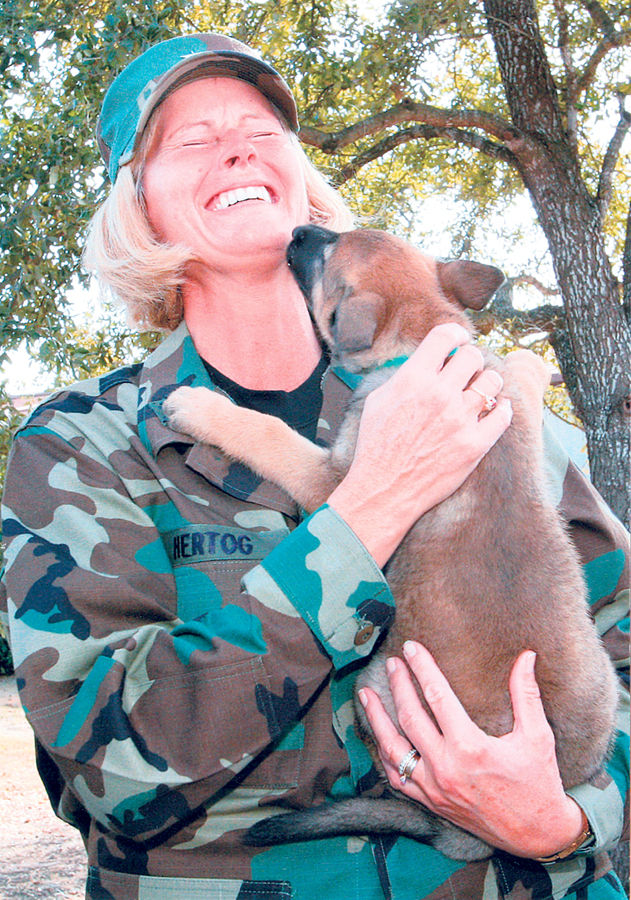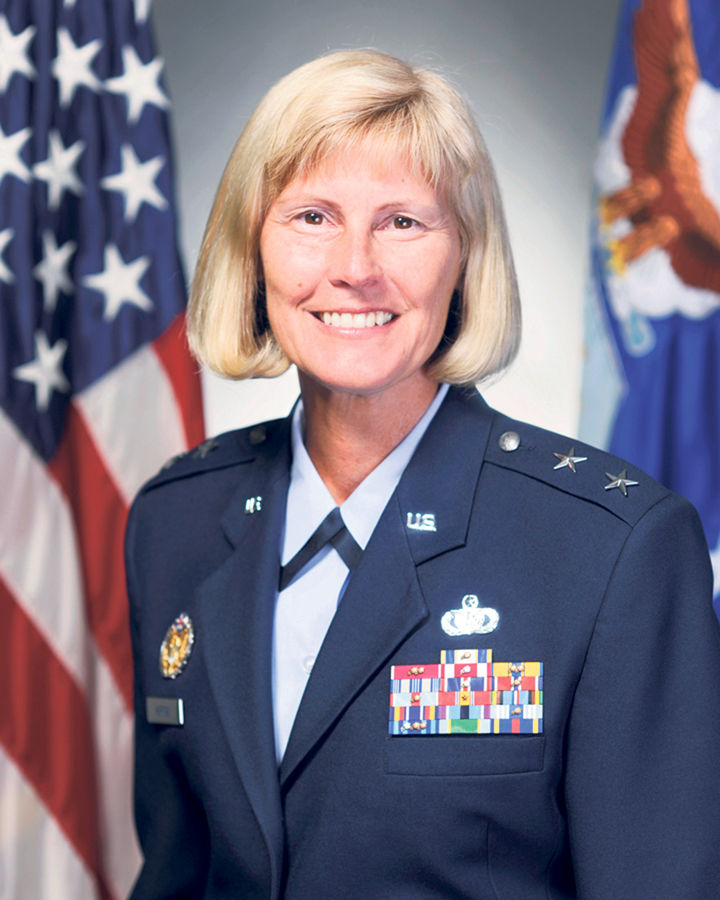Talk Story with Major General Mary Kay Hertog
Maj. Gen. Mary Kay Hertog retired from the U.S. Air Force after almost 34 years of service and in addition to making Kauai her home she is a member of the Police Commission. She took some time to talk about a fascinating life of service to her country.
The daughter of a retired Air Force colonel who was also in the security forces, Hertog considers Maryland home because she lived there for six years and attended high school. It was the longest stop for the military family.
As one of six siblings, Hertog is one of five who are retired military. Two brothers retired as Marine Corps officers, one a major and the other a lieutenant colonel. Two siblings retired from the AF, a brother was a major, and a sister was a colonel. The lone civilian is her eldest sister, who worked for a defense contractor.
Mary Kay Hertog and her spouse, retired AF Command Chief Master Sergeant Herm Hertog, have been married for 35 years. Several of her in-laws are also retired military and a nephew recently graduated from the U.S. Army Military Academy at West Point.
The Garden Island: How did you wind up on Kauai?
Mary Kay Hertog: My husband and I were assigned to installations on Oahu several years ago. We were both assigned to Hickam Air Force Base and then my husband was lucky enough to get a second assignment to Tripler, but I was stationed in New Mexico and Germany while he was on that assignment.
We really liked Hawaii and talked about eventually retiring on Oahu. But then we came to Kauai and we kept coming back because we loved the people and the beauty of the island. I remember seeing the sign outside the fire station in Koloa that says “One island. Many Peoples. All Kauaians” and I said, this is it. This is where I want to spend the rest of my life.
Luckily, Herm agreed and a few years ago we started looking for a place to live. In 2012 it all fell into place.
TGI: Tell us about your last job as director of the Sexual Assault Prevention and Response Office (SAPRO) under the Department of Defense to make sexual assault prosecution and policy a priority in all the services.
MKH: There is no doubt that this entire nation has a problem with sexual assault, and you can see it in the media reports in the military and on our college campuses. The DoD takes sexual assault very seriously and has made significant changes in policies, put the right people in the right positions, and so much more to eradicate this betrayal of military core values.
I was the first two-star general to be put in charge of this office and we moved out to make changes throughout all the services to establish consistency how these crimes are reported, investigated and prosecuted, and how our military members are trained on what constitutes sexual assault according to the Uniform Code of Military Justice. It’s important to put the victim of sexual assault in control, to give them the option of whether to report the assault up the chain of command to be investigated.
Whether they report it officially or not, the victim receives the care and support he or she needs, from assigning them a victim advocate to assigning them an attorney to explain the military justice system to them to encourage them to report the crime through command channels. And there have been so many positive changes made in the two years I have been retired and we are seeing it in the reporting statistics.
Congress, for many years, has required the military to provide statistics on sexual assaults. What we are seeing now is the rate of reports of sexual assault has increased.
Now many people may see that as negative, but in fact that is proof that all the changes made in the last three years indicate that sexual assault victims are more confident and comfortable that their commanders will take care of them, turn the case over to the investigative agency, and prosecute the offenders.
TGI: You mentioned that you encountered a health problem at the end of your career?
MKH: I was diagnosed with multiple sclerosis about six months before I retired. For a long time I knew there was something wrong with me, and I had seen many good AF doctors throughout the years.
Some thought it was just fatigue from working 14 hour days; others thought it was restless leg syndrome as my legs felt like an electric current was running through them, and still others thought it was knee problems from running too many miles over the years.
I thought I was just getting old. But when one of my legs started to drag and I would trip going up steps, or my leg would just collapse on me I knew it was more than aging. I had an MRI and a spinal tap and that was the confirmation needed to diagnose it as MS.
The doctors stated I probably had MS for 10 to 12 years! And when I think about it, the symptoms all started about that time, but as long as I was passing my annual fitness test I didn’t think much about it. I actually could have continued to remain on active duty if I had wanted too, but even before my diagnosis I had made the decision to retire. The diagnosis reinforced that it was the right time to retire and enjoy some quality time with my husband living in paradise. My husband and I had lived apart for 12 years at different assignments during out AF careers and we felt the timing was just perfect.
Within months of moving to Kauai in 2012, I heard about an MS support group that was forming so I went to my first meeting and met some wonderful people who are now my friends. Joy Ortiz-Zimmer is our team leader and Laurie Weber and Cynthia Edralin are dynamos at fundraising and all deserve a lot of credit for keeping the group going and growing.
Only 400,000 people on the U.S. have been officially diagnosed with MS but I bet there are thousands more out there, like me, that have it, but it goes undiagnosed for years. So if anyone reading this has MS and would like to join our support group, we meet the first Wednesday of every month at 5:30 p.m. You can contact Joy Ortiz-Zimmer at 635-8065 for details.
TGI: What are your favorite moments in the Air Force?
MKH: I have so many it’s hard to name just one. But I think just seeing people who worked for me at some point in their career succeed and get that promotion, or become an officer, or win a major award is what I find more rewarding than anything else. It’s knowing that I made a positive difference in someone’s life that means more to me than any promotion or recognition. And you never know when that happens until years later when you run into them and they tell you how you changed their life.
A few weeks before I retired, a lieutenant colonel walked up to me and told me I was the reason he had gotten his college degree and competed for a commission to become an officer. He had never forgotten something I had done for him 25 years earlier when he was an Airman working for me in a nuclear security unit.
He was working a swing shift and his wife went into early labor and he couldn’t get off duty to be with her to see their first child born. We just didn’t have an extra manpower available so the flight chief called me and asked what do we do?
It was about 6 p.m. in the afternoon and I was just about to head home for the day. But I went to the armory, pulled my M-16 rifle and ammo and took his place on post until 11 p.m. that night.
The good news was he made it to the hospital to be with his wife when their child was born. The bad news was his fellow patrolman had to ride around with Captain Hertog that night and you know that is not what that poor guy wanted to do!
To me, that action was not a big deal. You just take care of your people.
I forgot all about that until I ran into him years later just a month before I was retiring. But he had never forgotten what I had done and that motivated him to become an officer so he could take care of his troops. These are my lasting memories and they mean more to me than any promotion or recognition I’ve ever received.
TGI: How did you come to be appointed to the Kauai Police Commission?
MKH: I approached the mayor and volunteered my services in 2013 and I was honored to be selected and approved by the County Council. I see the commissioner position as an opportunity to represent the people of Kauai if they have concerns about KPD and it’s an opportunity to represent the members of the KPD.
I think the challenges facing a small island police department are similar to the challenges facing any sized police department. You’ve got to recruit and retain the right people, make sure they continue to hone their training tactics as that is never static, maintain the best possible equipment be it vehicles, weapons, body armor and the list goes on. And you have to make sure they never forget their primary mission, which is to serve and protect, which is all about core values of respect, integrity, and professionalism. And of course, this all has to be done in a fiscal environment where money is always tight and costs keep increasing. So the challenges are the same — what is our priority, and what do we have to offset if there is a critical need that we must fill.
TGI: Is there a difference in how you approach public safety on a small island community?
Leadership is leadership, be it in a small police department or be it in a unit with thousands of airmen. We may come from different life experiences but we are more alike than different. I believe we all have the same goals and that’s to exercise our responsibilities under the Police Commission Charter to the best of our abilities and be the interface between KPD and the citizens of Kauai. It’s very similar to the military — it’s all about taking care of the people and the mission.
TGI: What do you enjoy doing with your time now?
MKH: I enjoy being a volunteer tutor with Hawaii Literacy and have three students that I work with every week. It’s one-on-one tutoring with adults who need help on their basic reading, and writing in English skills. Dennis and Claudia Dresser run the program and are really making a difference in the lives of students from all backgrounds that are determined to improve themselves and that’s what I find so rewarding about it. We really need tutors so if anyone is interested call (808) 332-5544.




